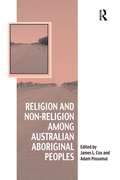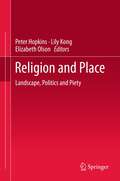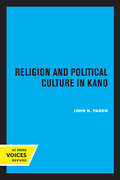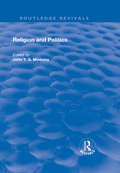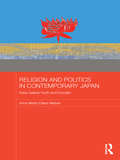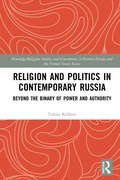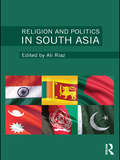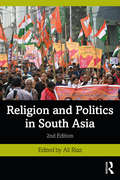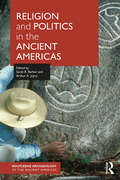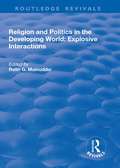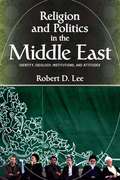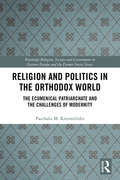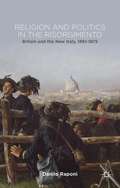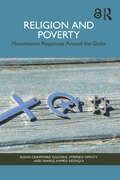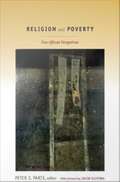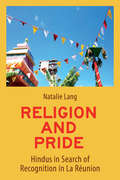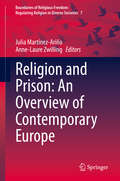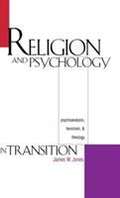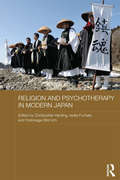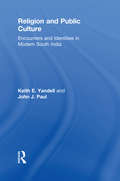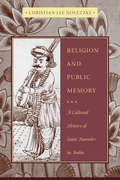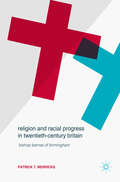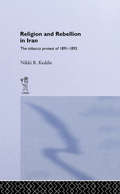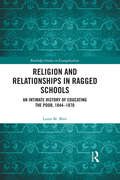- Table View
- List View
Religion and Non-Religion among Australian Aboriginal Peoples (Vitality of Indigenous Religions)
by Adam Possamai James L. CoxOffering a significant contribution to the emerging field of 'Non-Religion Studies', Religion and Non-Religion among Australian Aboriginal Peoples draws on Australian 2011 Census statistics to ask whether the Indigenous Australian population, like the wider Australian society, is becoming increasingly secularised or whether there are other explanations for the surprisingly high percentage of Aboriginal people in Australia who state that they have 'no religion'. Contributors from a range of disciplines consider three central questions: How do Aboriginal Australians understand or interpret what Westerners have called 'religion'? Do Aboriginal Australians distinguish being 'religious' from being 'non-religious'? How have modernity and Christianity affected Indigenous understandings of 'religion'? These questions re-focus Western-dominated concerns with the decline or revival of religion, by incorporating how Indigenous Australians have responded to modernity, how modernity has affected Indigenous peoples' religious behaviours and perceptions, and how variations of response can be found in rural and urban contexts.
Religion and Place
by Peter Hopkins Elizabeth Olson Lily KongThis unique collection highlights the importance of landscape, politics and piety to our understandings of religion and place. The geographies of religion have developed rapidly in the last couple of decades and this book provides both a conceptual framing of the key issues and debates involved, and rich illustrations through empirical case studies. The chapters span the discipline of human geography and cover contexts as diverse as veiling in Turkey, religious landscapes in rural Peru, and refugees and faith in South Africa. A number of prominent scholars and emerging researchers examine topical themes in each engaging chapter with significant foci being: religious transnationalism and religious landscapes; gendering of religious identities and contexts; fashion, faith and the body; identity, resistance and belief; immigrant identities, citizenship and spaces of belief; alternative spiritualities and places of retreat and enchantment. Together they make a series of important contributions that illuminate the central role of geography to the meaning and implications of lived religion, public piety and religious embodiment. As such, this collection will be of much interest to researchers and students working on topics relating to religion and place, including human geographers, sociologists, religious studies and religious education scholars.
Religion and Political Culture in Kano
by John N. PadenThis title is part of UC Press's Voices Revived program, which commemorates University of California Press’s mission to seek out and cultivate the brightest minds and give them voice, reach, and impact. Drawing on a backlist dating to 1893, Voices Revived makes high-quality, peer-reviewed scholarship accessible once again using print-on-demand technology. This title was originally published in 1973.
Religion and Politics
by John T.S. MadeleyThis title was first published in 2003. This subject area of this work cross-cuts conventional sub-disciplinary boundaries in the study of comparative politics. Connections between religion and and politics can be identified in all of the thematic areas covered by the articles within.
Religion and Politics in Contemporary Japan: Soka Gakkai Youth and Komeito (Japan Anthropology Workshop Series)
by Anne Mette Fisker-NielsenPresenting a study of politics at grassroots level among young Japanese, this book examines the alliance between the religious movement Soka Gakkai (the ‘Value-creation Society’) and Komeito (the ‘Clean Government Party’), which shared power with the Liberal Democratic Party from 1999 to 2009. Drawing on primary research carried out among Komeito supporters, the book focuses on the lives of supporters and voters in order to better understand the processes of democracy. It goes on to discuss what the political behaviour of young Komeito supporters tell us about the role of religious organizations, such as Soka Gakkai, in Japanese politics. Unlike most other books on politics in Japan which tend to concentrate on political elites, this book provides extremely valuable insights into political culture at the grassroots level.
Religion and Politics in Contemporary Russia: Beyond the Binary of Power and Authority (Routledge Religion, Society and Government in Eastern Europe and the Former Soviet States)
by Tobias KöllnerBased on extensive original research at the local level, this book explores the relationship between Russian Orthodoxy and politics in contemporary Russia. It reveals close personal links between politicians at the local, regional and national levels and their counterparts at the equivalent level in the Russian Orthodox Church – priests and monks, bishops and archbishops – who are extensively consulted about political decisions. It outlines a convergence of conservative ideology between politicians and clerics and also highlights that, despite working closely together, there are nevertheless many tensions. The book examines in detail particular areas of cooperation and tension: reform to religious education and a growing emphasis on traditional moral values, the restitution of former church property and the introduction of new festive days. Overall, the book concludes that there is much uncertainty, ambiguity and great local variation.
Religion and Politics in South Asia
by Ali RiazReligion and religio-political forces have become potent influences in the domestic politics of many countries irrespective of geographical location, stages of economic growth, and systems of governance. The growing importance of religion as a marker of identity and a tool of political mobilization is reshaping the political landscape in an unprecedented manner, and South Asia, which contains the world’s largest populations of Muslims and Hindus with significant number of Buddhists, is no exception to this fact. This book presents a comprehensive analysis of the interaction of religion and politics in Afghanistan, Bangladesh, India, Nepal, Pakistan and Sri Lanka. Although the specific circumstances of each country are different, in recent decades, religion, religio-political parties, and religious rhetoric have become dominant features of the political scenes in all six countries. The contributors offer a thorough examination of these developments by presenting each country's political system and the socio-economic environment within which the interactions are taking place. The analysis of the various factors influencing the process of the interactions between religion and politics, and their impact on the lives of the people of the region and global politics constitute the core of the chapters.
Religion and Politics in South Asia
by Ali RiazThis revised edition of Religion and Politics in South Asia presents a comprehensive analysis of the interaction of religion and politics in Afghanistan, Bangladesh, India, the Maldives, Nepal, Pakistan, and Sri Lanka. The book highlights that in recent decades, religion, religio-political parties, and religious rhetoric have become dominant features of the political scenes in all seven countries. By presenting each country's political system and the socio-economic environment within which the interactions of religion and politics are taking place, chapters explore various factors that affect both the lives of people in the region and global politics. Designed in an easy-to-follow structure, the book includes sections on the history and politics, major religions and religious composition of the population, legal and constitutional provisions regarding religion, religious freedom and the treatment of minorities, the political landscape, and religio-political parties and groups within the countries. In doing so, the book addresses concerns including the effects of religio-political interactions on political stability, human rights, and the implications for internal and external security situations. A timely contribution written by experts in their field, this book is a useful guide to religion and politics and will be of interest to undergraduate and graduate students in South Asian politics, Asian politics, religion and politics, history, and international studies.
Religion and Politics in the Ancient Americas (Routledge Archaeology of the Ancient Americas)
by Arthur A. Joyce Sarah BarberThis exciting collection explores the interplay of religion and politics in the precolumbian Americas. Each thought-provoking contribution positions religion as a primary factor influencing political innovations in this period, reinterpreting major changes through an examination of how religion both facilitated and constrained transformations in political organization and status relations. Offering unparalleled geographic and temporal coverage of this subject, Religion and Politics in the Ancient Americas spans the entire precolumbian period, from Preceramic Peru to the Contact period in eastern North America, with case studies from North, Middle, and South America. Religion and Politics in the Ancient Americas considers the ways in which religion itself generated political innovation and thus enabled political centralization to occur. It moves beyond a "Great Tradition" focus on elite religion to understand how local political authority was negotiated, contested, bolstered, and undermined within diverse constituencies, demonstrating how religion has transformed non-Western societies. As well as offering readers fresh perspectives on specific archaeological cases, this book breaks new ground in the archaeological examination of religion and society.
Religion and Politics in the Developing World: Explosive Interactions (Routledge Revivals)
by Rolin MainuddinThis title was first published in 2002: What is the relationship between religion and politics? How are they associated in the developing world? When does the interface between them result in violence? This volume attempts to answer these questions. In particular, the objective is to understand the circumstances that lead to explosive interactions between religion and politics in the developing world. However, this focus does not imply a perpetual tension between the religious and political spheres. Rather, it explores those historical moments when the relationship does break down and often ends in violent conflicts. The contributors have expertise in fields such as anthropology, history and political science.
Religion and Politics in the Middle East
by Robert D. LeeThis is a comparative study of the interaction between the religious and political spheres in the Middle East. Lee (political science, Colorado College) examines the relationship in Egypt, Israel, Turkey, and Iran in terms of group identity, ideology, institutions, and political culture. He concludes that, as independent variable, religion has contributed to political development as much as hindered it, but that religion is far more a dependent value that is shaped by the state context within which it operates. Annotation ©2009 Book News, Inc. , Portland, OR (booknews. com)
Religion and Politics in the Middle East
by Robert D. LeeThis innovative book analyzes the interaction of politics and religion in the Middle East through a comparative study of four countries--Egypt, Israel, Turkey, and Iran. Author Robert D. Lee examines each country in terms of four areas in which state and religion necessarily interact: group identity, ideology, institutions, and political culture. He also considers twenty-five commonly encountered (but often contradictory) hypotheses asserting that religion is either an obstacle or an aid to political development, or that religion is largely irrelevant to the development process. The author concludes that politics shapes religion as much or more than religion shapes politics. The nature of religious organization and practice in the Middle East cannot be understood without reference to a national political context.
Religion and Politics in the Orthodox World: The Ecumenical Patriarchate and the Challenges of Modernity (Routledge Religion, Society and Government in Eastern Europe and the Former Soviet States)
by Paschalis KitromilidesThis book explores how the Ecumenical Patriarchate, the leading centre of spiritual authority in the Orthodox Church, based in Istanbul, coped with political developments from Ottoman times until the present. The book outlines how under the Ottomans, despite difficult circumstances, the Patriarchate managed to draw on its huge symbolic and moral power and organization to uphold the unity and catholicity of the Orthodox Church, how it struggled to do this during the subsequent age of nationalism when churches within new nation-states unilaterally claimed their autonomy reflecting local national demands, and how the church coped in the twentieth century with the rise of nationalist Turkey, the decline of Orthodoxy in Asia Minor and with the Cold War. The book concludes by assessing the current position and future prospects of the Patriarchate in the region and the world.
Religion and Politics in the Risorgimento
by Danilo RaponiThis book examines Anglo-Italian political and cultural relations and analyses the importance of religion in the British 'Orientalist' perception of Italy. It puts religion at the centre of a harsh political and cultural war, one that was fought on international, diplomatic, and domestic levels.
Religion and Poverty: Monotheistic Responses Around the Globe
by Stephen Offutt Susan Crawford Sullivan Shariq Ahmed SiddiquiThis book offers a timely and compelling look at religion and poverty, focusing primarily on the two largest world religions, Christianity and Islam, and considering religion and poverty in the United States and international contexts.Written by social scientists, the book incorporates relevant theology with a focus on how theology is lived in relation to issues of poverty. Topics include religion as it relates to social service provision, lived religion, philanthropy, faith-based social movements, public policy, and more. This volume synthesizes existing research on religion and poverty and includes new original research.It is an essential resource for upper-level undergraduate or graduate courses focused on religion and poverty and is also an outstanding supplementary text for broader courses in religion, poverty, social welfare, philanthropy, and non-profit organizations.
Religion and Poverty: Pan-African Perspectives
by Peter J. ParisA Ghanaian scholar of religion argues that poverty is a particularly complex subject in traditional African cultures, where holistic worldviews unite life's material and spiritual dimensions. A South African ethicist examines informal economies in Ghana, Jamaica, Kenya, and South Africa, looking at their ideological roots, social organization, and vulnerability to global capital. African American theologians offer ethnographic accounts of empowering religious rituals performed in churches in the United States, Jamaica, and South Africa. This important collection brings together these and other Pan-African perspectives on religion and poverty in Africa and the African diaspora. Contributors from Africa and North America explore poverty's roots and effects, the ways that experiences and understandings of deprivation are shaped by religion, and the capacity and limitations of religion as a means of alleviating poverty. As part of a collaborative project, the contributors visited Ghana, Kenya, and South Africa, as well as Jamaica and the United States. In each location, they met with clergy, scholars, government representatives, and NGO workers, and they examined how religious groups and community organizations address poverty. Their essays complement one another. Some focus on poverty, some on religion, others on their intersection, and still others on social change. A Jamaican scholar of gender studies decries the feminization of poverty, while a Nigerian ethicist and lawyer argues that the protection of human rights must factor into efforts to overcome poverty. A church historian from Togo examines the idea of poverty as a moral virtue and its repercussions in Africa, and a Tanzanian theologian and priest analyzes ujamaa, an African philosophy of community and social change. Taken together, the volume's essays create a discourse of mutual understanding across linguistic, religious, ethnic, and national boundaries. Contributors. Elizabeth Amoah, Kossi A. Ayedze, Barbara Bailey, Katie G. Cannon, Noel Erskine, Dwight N. Hopkins, Simeon O. Ilesanmi, Laurenti Magesa, Madipoane Masenya, Takatso A. Mofokeng, Esther M. Mombo, Nyambura J. Njoroge, Jacob Olupona, Peter J. Paris, Anthony B. Pinn, Linda E. Thomas, Lewin L. Williams
Religion and Pride: Hindus in Search of Recognition in La Réunion
by Natalie LangSeeking recognition presents an important driving force in the making of religious minorities, as is shown in this study that examines current debates on religion, globalization, diaspora, and secularism through the lens of Hindus living in the French overseas department of La Réunion. Through the examination of religious practices and public performance, the author offers a compelling study of how the Hindus of the island assert pride in their religion as a means of gaining recognition, self-esteem, and social status.
Religion and Prison: An Overview of Contemporary Europe (Boundaries of Religious Freedom: Regulating Religion in Diverse Societies #7)
by Julia Martínez-Ariño Anne-Laure ZwillingThis volume offers a European overview of the management of religious diversity in prisons and provides readers with rich empirical material and a comparative perspective. The chapters combine both legal and sociological approaches. Coverage for each country includes historical background, current penitentiary organization, and recent changes or trends. In their exploration of legal aspects, the contributors look at such factors as the status of prison chaplains and regulations concerning religious practice and religious freedom. These include meals, prayers, and visits. The sociological analysis examines religious discrimination in prison, church-prison relations, conversion and proselytism, and more. The European coverage includes countries for which such information is seldom available. The book offers readers a better understanding of governance of religion in prisons. This text appeals to students, researchers and professionals in the field.
Religion and Psychology in Transition: Psychoanalysis, Feminism, and Theology
by James W. JonesIn this thought-provoking book, clinical psychologist and professor of religious studies James W. Jones presents a dialogue between contemporary psychoanalytic thinking and contemporary theology. He sheds new light on the interaction of religion and psychology by viewing it from the perspective of world religions, providing an epistemological framework for the psychology of religion that draws on contemporary philosophy of science, and bringing out the importance of gender as a category of analysis. Developments in psychoanalysis provide new resources for theological reflection, Jones contends. The Freudian view that human nature is isolated and instinctual has shifted to a vision of the self as constituted in and through relationships. Jones uses this relational model of human nature to explore the convergence between contemporary psychoanalysis, feminist theorizing, and themes in religious thought found in a variety of traditions. He also critiques the reductionism inherent in Freud's discussion of religion and proposes nonreductionistic and genuinely psychoanalytic ways for psychoanalysis to treat religious topics. For therapists, psychologists, theologians, and others interested in spiritual or psychological issues, Jones offers illuminating clinical material and insightful analysis.
Religion and Psychotherapy in Modern Japan (Routledge Contemporary Japan Series)
by Christopher Harding Iwata Fumiaki Yoshinaga Shin’ichiSince the late nineteenth century, religious ideas and practices in Japan have become increasingly intertwined with those associated with mental health and healing. This relationship developed against the backdrop of a far broader, and deeply consequential meeting: between Japan’s long-standing, Chinese-influenced intellectual and institutional forms, and the politics, science, philosophy, and religion of the post-Enlightenment West. In striving to craft a modern society and culture that could exist on terms with – rather than be subsumed by – western power and influence, Japan became home to a religion--psy dialogue informed by pressing political priorities and rapidly shifting cultural concerns. This book provides a historically contextualized introduction to the dialogue between religion and psychotherapy in modern Japan. In doing so, it draws out connections between developments in medicine, government policy, Japanese religion and spirituality, social and cultural criticism, regional dynamics, and gender relations. The chapters all focus on the meeting and intermingling of religious with psychotherapeutic ideas and draw on a wide range of case studies including: how temple and shrine ‘cures’ of early modern Japan fared in the light of German neuropsychiatry; how Japanese Buddhist theories of mind, body, and self-cultivation negotiated with the findings of western medicine; how Buddhists, Christians, and other organizations and groups drew and redrew the lines between religious praxis and psychological healing; how major European therapies such as Freud’s fed into self-consciously Japanese analyses of and treatments for the ills of the age; and how distress, suffering, and individuality came to be reinterpreted across the twentieth and early twenty-first centuries, from the southern islands of Okinawa to the devastated northern neighbourhoods of the Tohoku region after the earthquake, tsunami, and nuclear disasters of March 2011. Religion and Psychotherapy in Modern Japan will be welcomed by students and scholars working across a broad range of subjects, including Japanese culture and society, religious studies, psychology and psychotherapy, mental health, and international history.
Religion and Public Culture: Encounters and Identities in Modern South India
by Keith E. Keith E. Yandell John J. PaulThe last two centuries have witnessed profound changes in the nature of public consciousness. Nowhere has this been more true than in India, especially in relation to changing cultures of public life and religious tradition in South India. Essays in this collection attempt to explore the intricacies of what is perhaps the single most complex socio-religious environment in the world. The essays consider the evolution of the notion of Hinduism as a distinct and singular separate religion; the relationship between this kind of formulation and various European or western influences in India; and differences which the formation of this idea and its acceptance have made upon wider public consciousness. Each essay also considers certain general issues - such as the passing along of religious authority from one generation to the next, and the rise of disputes over matters both ideological (or doctrinal) and institutional, disputes that are fundamental to the traditions concerned and yet have unmistakable cross-cultural references.
Religion and Public Memory: A Cultural History of Saint Namdev in India
by Christian Lee NovetzkeNamdev is a central figure in the cultural history of India, especially within the field of bhakti, a devotional practice that has created publics of memory for over eight centuries. Born in the Marathi-speaking region of the Deccan in the late thirteenth century, Namdev is remembered as a simple, low-caste Hindu tailor whose innovative performances of devotional songs spread his fame widely. He is central to many religious traditions within Hinduism, as well as to Sikhism, and he is a key early literary figure in Maharashtra, northern India, and Punjab. In the modern period, Namdev appears throughout the public spheres of Marathi and Hindi and in India at large, where his identity fluctuates between regional associations and a quiet, pan-Indian, nationalist-secularist profile that champions the poor, oppressed, marginalized, and low caste. Christian Lee Novetzke considers the way social memory coheres around the figure of Namdev from the sixteenth century to the present, examining the practices that situate Namdev's memory in multiple historical publics. Focusing primarily on Maharashtra and drawing on ethnographies of devotional performance, archival materials, scholarly historiography, and popular media, especially film, Novetzke vividly illustrates how religious communities in India preserve their pasts and, in turn, create their own historical narratives.
Religion and Racial Progress in Twentieth-Century Britain
by Patrick T. MerricksThis book is the first in-depth analysis of Ernest William Barnes' Christian-eugenic philosophy: 'bio-spiritual determinism'. As a testament to the popularity of the movement, mid-twentieth century British eugenics is contextualized within a remarkably diverse selection of discourses including secular and Anglican interpretations of modernism, poverty, population, gender equality, pacifism and racism. This begins to address the scholastic gap on Christian eugenics while highlighting the perseverance of eugenic racism after World War Two.
Religion and Rebellion in Iran: The Iranian Tobacco Protest of 1891-1982
by Nikki R. KeddieAn account of the events of the Iranian Tobacco protest of 1891 to 1892. This book examines the developments which led to this sudden outburst of opposition, traces the course of events in each city and notes the importance of the protest for the creation of the Iranian opposition movemnent.
Religion and Relationships in Ragged Schools: An Intimate History of Educating the Poor, 1844-1870 (Routledge Studies in Evangelicalism)
by Laura M. MairFocusing on the interaction between teachers and scholars, this book provides an intimate account of "ragged schools" that challenges existing scholarship on evangelical child-saving movements and Victorian philanthropy. With Lord Shaftesbury as their figurehead, these institutions provided a free education to impoverished children. The primary purpose of the schools, however, was the salvation of children’s souls. Using promotional literature and local school documents, this book contrasts the public portrayal of children and teachers with that found in practice. It draws upon evidence from schools in Scotland and England, giving insight into the achievements and challenges of individual institutions. An intimate account is constructed using the journals maintained by Martin Ware, the superintendent of a North London school, alongside a cache of letters that children sent him. This combination of personal and national perspectives adds nuance to the narratives often imposed upon historic philanthropic movements. Investigating how children responded to the evangelistic messages and educational opportunities ragged schools offered, this book will be of keen interest to historians of education, emigration, religion, as well as of the nineteenth century more broadly.
